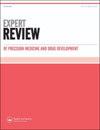HLA-C基因分型在银屑病个体化治疗中的价值
IF 1.2
Q4 PHARMACOLOGY & PHARMACY
Expert Review of Precision Medicine and Drug Development
Pub Date : 2021-03-04
DOI:10.1080/23808993.2021.1878022
引用次数: 0
摘要
摘要简介:不幸的是,一些银屑病患者仍然对可用于控制银屑病的生物技术疗法没有反应,反应不充分或失去反应。常见的解决方案是转向其他生物药物,从而相应增加制药成本。遗传多态性最近也被证明会影响银屑病患者对生物药物的反应。涵盖领域:在PubMed数据库中搜索关于HLA-C和生物疗法反应的文章。从PubMed的文章和相关引文中发现的参考文献中收集了其他出版物。专家意见:对特定生物药物的临床反应可能与基因变异有关。由于基因变异导致不同的分子途径,在银屑病患者中识别能够预测对生物制剂反应的遗传标记物至关重要。从这个意义上说,最近发表在文献中的证据表明,HLA-C*06:02代表了银屑病的一种分子上不同的亚型,其维持和扩增受到IL12/23信号的强烈控制,因此对该信号通路的选择性阻断更敏感,并且还不能排除该等位基因也影响对最新的抗IL-17药物的反应。本文章由计算机程序翻译,如有差异,请以英文原文为准。
The value of genotyping patients for the presence of HLA-C in the personalized treatment of psoriasis
ABSTRACT Introduction: Some cases of psoriasis still unfortunately do not respond, do not respond adequately or lose response to biotechnological therapies available to help control psoriasis. The common solution is to switch to other biological drugs, with a corresponding increase in pharmaceutical costs. Genetic polymorphisms have also recently been shown to influence the response of psoriasis patients to biological drugs. Areas covered: The PubMed databases were searched for articles regarding HLA-C and response to biological therapies. Additional publications were collected from references identified in articles and related citations in PubMed. Expert opinion: The clinical response to a specific biological drug may be correlated with genetic variations. Since genetic variations lead to different molecular pathways, identifying genetic markers in psoriasis patients that can predict a response to biologics is of fundamental importance. In this sense, recent evidences published in literature, suggest that HLA-C*06:02 typifies a molecularly different subtype of psoriasis whose maintenance and amplification are strongly controlled by IL12/23 signaling and therefore more responsive to the selective blockade of this signaling pathway, and it is not yet possible to exclude that this allele also influences the response to the most recent anti-IL-17 drugs.
求助全文
通过发布文献求助,成功后即可免费获取论文全文。
去求助
来源期刊

Expert Review of Precision Medicine and Drug Development
PHARMACOLOGY & PHARMACY-
CiteScore
2.30
自引率
0.00%
发文量
9
期刊介绍:
Expert Review of Precision Medicine and Drug Development publishes primarily review articles covering the development and clinical application of medicine to be used in a personalized therapy setting; in addition, the journal also publishes original research and commentary-style articles. In an era where medicine is recognizing that a one-size-fits-all approach is not always appropriate, it has become necessary to identify patients responsive to treatments and treat patient populations using a tailored approach. Areas covered include: Development and application of drugs targeted to specific genotypes and populations, as well as advanced diagnostic technologies and significant biomarkers that aid in this. Clinical trials and case studies within personalized therapy and drug development. Screening, prediction and prevention of disease, prediction of adverse events, treatment monitoring, effects of metabolomics and microbiomics on treatment. Secondary population research, genome-wide association studies, disease–gene association studies, personal genome technologies. Ethical and cost–benefit issues, the impact to healthcare and business infrastructure, and regulatory issues.
 求助内容:
求助内容: 应助结果提醒方式:
应助结果提醒方式:


